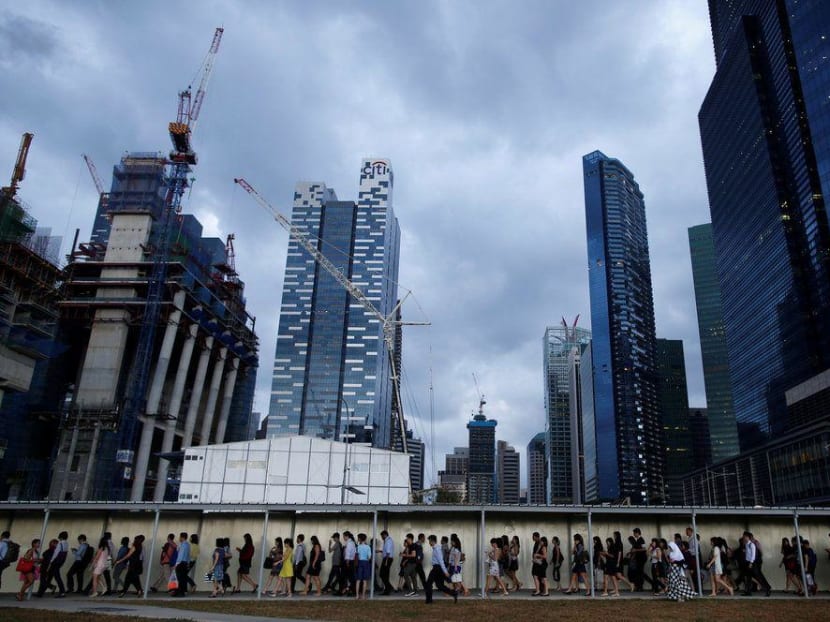Despite global uncertainties, S'pore beat expectations to secure S$15b worth of investments in 2019: EDB
SINGAPORE — Despite global uncertainties arising from United States-China trade tensions, Singapore far exceeded expectations by attracting S$15.2 billion worth of investments in 2019, which are expected to create more than 30,000 jobs in the coming years.

The S$15.2 billion in investment commitments secured by the Economic Development Board in 2019 easily beat its target of S$8 billion to S$10 billion.
SINGAPORE — Despite global uncertainties arising from United States-China trade tensions, Singapore far exceeded expectations by attracting S$15.2 billion worth of investments in 2019, which are expected to create more than 30,000 jobs in the coming years.
Wrapping up its 2019 performance on Thursday (Jan 16), the Economic Development Board (EDB) — the Government agency in charge of bringing overseas investments into Singapore — said its strong showing reflects companies’ confidence in Asia's growth prospects and the Republic's strategic position within the region, as well as its sophisticated workforce.
Its investment target for 2019 was set at between S$8 billion and S$10 billion, which means investment commitments beat the target by more than 50 per cent.
When asked during a press conference whether any of the investments came from Hong Kong, EDB’s chairman Beh Swan Gin said Singapore did not benefit from the protest-wracked city.
Fixed asset investments from chemical companies formed the biggest portion of investments at 32.2 per cent. Electronic firms came in second at 30.2 per cent.
Mr Beh said this is because many are making preparations for the eventual rebound in the manufacturing sector, particularly electronics, a trend that has been widely anticipated by industry observers.
Besides securing S$15.2 billion in investment commitments, EDB also attracted S$9 billion in total business expenditure, which refers to what companies will spend on wages and rental in the coming years.
In addition to the 32,800 jobs that will be created, these commitments are projected to contribute S$29.4 billion directly to Singapore’s gross domestic product, or economic output, in the future.
Close to half of these new jobs would be digital job roles.
However, Mr Beh said that workers need not be trained in coding or data analytics to take up these digital jobs.
“They are operating in a digital milieu, but they may have quite traditional training but it’s just that they have to be, of course, comfortable working in the digital milieu,” he said.
Despite the investments secured in 2019, Trade and Industry Minister Chan Chun Sing said during a media briefing on Thursday morning before the public release of EDB’s data that the Government is approaching 2020 with guarded optimism.
This is because there remain challenges in the global environment, such as unresolved issues between the US and China — notwithstanding the signing of the “phase one” trade deal between the world’s two largest economies.
The measures taken against global warming, such as carbon constraints, would have an impact on the type of industries and companies that Singapore can attract, Mr Chan said.
Looking ahead, the EDB will also be moving from a year-to-year comparison to focusing on how it performed in the medium-to-long-term, as that is usually how companies function as well, said its managing director Chng Kai Fong.
EDB has an annual target of securing between S$8 billion and S$10 billion of investments and creating 16,000 to 18,000 jobs over the medium-to-long term.
While Singapore would not be able to compete with other countries for investments based on land size, lower costs or a large domestic market, Mr Chng said that Singapore’s advantage is in its sophisticated workforce and political stability.
The Singapore approach in attracting these investments is to eventually have more Singaporeans trained and taking up better-paying jobs that were initially held by foreigners brought in by these investments, said Mr Chan, reiterating a point he made in Parliament on Jan 6.
While he said this approach has started to bear fruit with younger Singaporeans taking up these jobs, there are others, especially those in their 40s and 50s, who may be left behind.
“We must intensify our efforts to help them get the (better-paying) jobs. That is the way we go forward. So we are very confident of the younger generation, but we must do more to help the middle-aged get those jobs,” said Mr Chan, who was elaborating on the issue of the local-foreigner workforce breakdown to reporters.
If and when Singaporeans manage to leave lower-paying jobs for better positions, the question remains of what should be done to fill these jobs.
Mr Chan said one way is to fill that position by hiring a foreign worker, which would not be a popular option among Singaporeans.
The other alternative, if the company is not able to fill that position, would be the prospect of closing down and therefore affecting other Singaporeans who are working in that company, he added.











